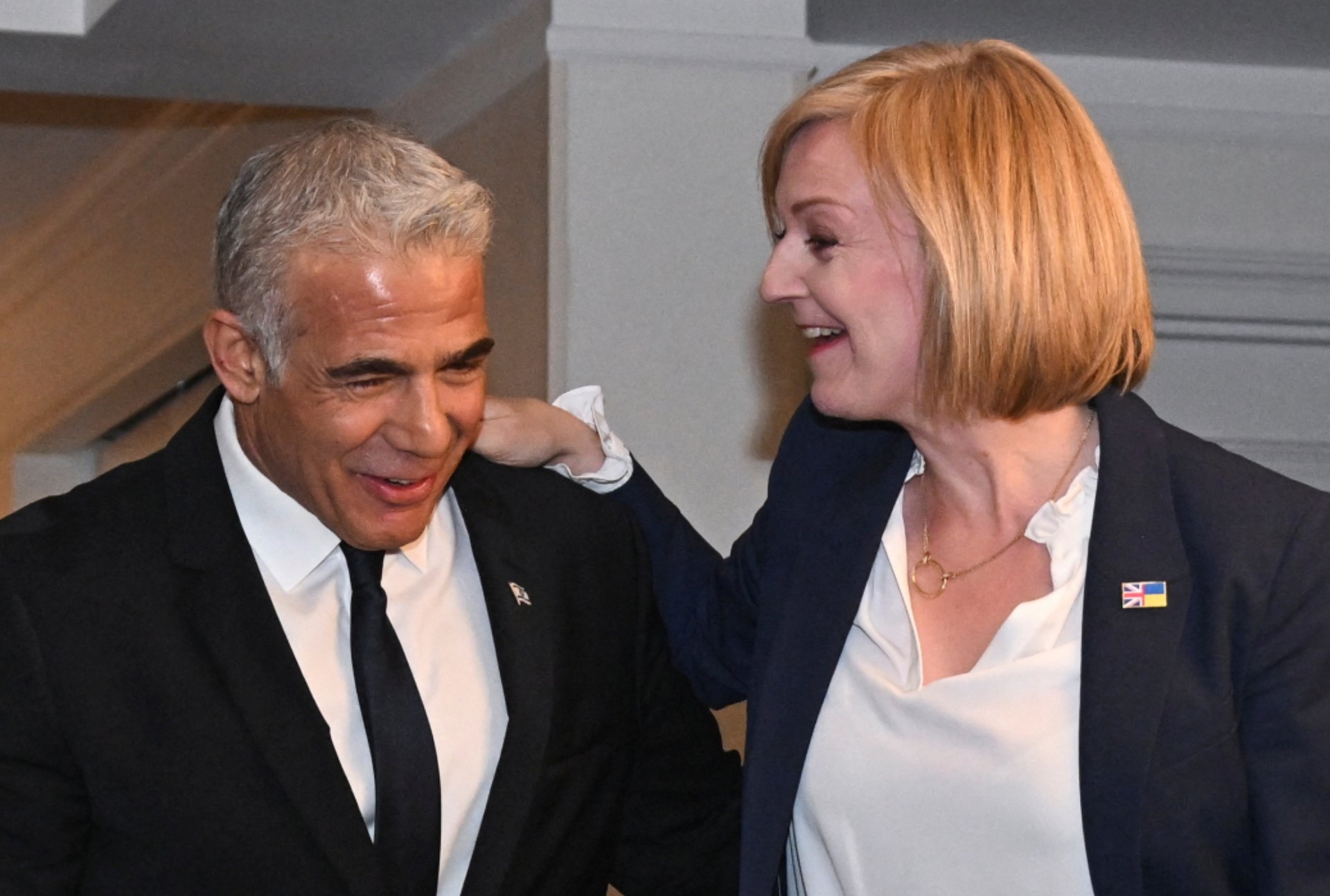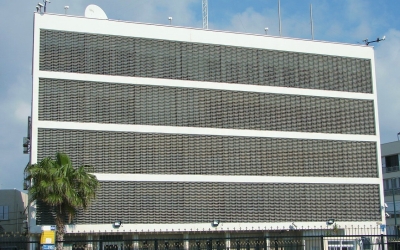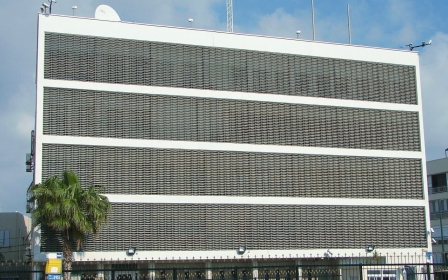UK 'already owns land for embassy in Jerusalem', pro-Israel group tells Tory MPs

The British government already owns land in west Jerusalem earmarked as the site of a new embassy in Israel, according to a briefing note sent to pro-Israel Conservative members of parliament seen by Middle East Eye.
The note has been circulated by the Conservative Friends of Israel (CFI) lobby group as part of a campaign in support of Prime Minister Liz Truss’s controversial decision, announced last month, to review the location of the British embassy.
James Gurd, the director of CFI, sent the note to MPs setting out the case for Jerusalem last Saturday, on the eve of this week’s party conference in Birmingham along with a “suggested casework response” for MPs to send to constituents.
MEE has seen the documents and is publishing them both in full.
The briefing note says that a move to relocate the British embassy from its current location in Tel Aviv to Jerusalem would be “a bureaucratic one that recognises the reality on the ground”.
It also says: “It is understood that the UK government already owns land in west Jerusalem for an embassy to be built there” – a revelation which implies that Liz Truss could be ready to set the move in motion the moment it is given the go-ahead.
The casework response - the text of a proposed letter for MPs to send to concerned constituents - says that moving the embassy to Jerusalem would be "righting a historical anomaly".
It says: "It has long been customary for sovereign countries to choose their capital city and for Embassies and other diplomatic offices to be located there. Israel should be no different in this regard."
'Huge Zionist'
CFI describes its twin aims as "supporting Israel and promoting Conservatism in the UK".
It says it is active at every level of the Conservative party and is thought to include about 80 percent of Conservative MPs among its members.
On Sunday, Truss and other cabinet ministers attended a CFI-hosted event to mark the opening of the party conference, telling those present that she was a “huge Zionist and huge supporter of Israel”.
Writing also in CFI’s annual Informed magazine, which was published to coincide with the conference, Truss said: “I understand the importance and sensitivity of the location of the British Embassy in Israel and I am committed to a review to ensure we are operating on the strongest footing within Israel”.
Speaking at Sunday’s CFI event, Jake Berry, the Conservative party chairman, went further, appearing to pre-empt the outcome of Truss’ review when he pledged “my unwavering commitment as chairman of the party that we will continue to build strong relationships with the state of Israel and to support it in its fight to ensure that it remains safe and that the capital in Jerusalem is the home to our new embassy”.
Robert Jenrick, the health minister, also alluded to UK government-owned land where an embassy could be built.
Jenrick said: “We have a site in Jerusalem there waiting to go. It is time we took responsibility and built that embassy and recognised that the true capital of the state of Israel is obviously Jerusalem”.
The CFI “casework response” supplies a draft letter for MPs to send to constituents including the wording that “I welcome Prime Minister Liz Truss’s pledge to review the location of the British Embassy in Israel".
A spokesman for CFI dismissed a suggestion from MEE that the organisation was lobbying Tory MPs in favour of the move.
A spokesman said: “It’s a one-page briefing note of the kind that we send out on any issue.”
CFI chairman Eric Pickles told MEE: “Moving the embassy is entirely compatible with a two-state solution and makes no decision about the final boundaries. This is a very moderate move.”
Dramatic lurch
Truss’s move to review the location of the embassy represents a dramatic lurch from long-established British government policy that has held firm through all prime ministers from Margaret Thatcher to Boris Johnson.
Former UK Prime Minister Theresa May condemned the move in unequivocal terms, noting in a December 2017 statement issued in response to the US government’s decision to move its embassy to Jerusalem: “We believe it is unhelpful in terms of prospects for peace in the region … In line with relevant Security Council resolutions, we regard East Jerusalem as part of the occupied Palestinian territories.”
Her position was reaffirmed by the British government as recently as December 2021.
“The United Kingdom’s position on the status of Jerusalem is clear and long-standing: it should be determined in a negotiated settlement between the Israelis and the Palestinians,” the UK’s political coordinator at the UN said in a speech, adding that the UK “opposes unilateral action in Jerusalem absent a final status settlement and remains supportive of the historic status quo”.
Avi Shlaim, emeritus professor of international relations at Oxford University, supported this long-standing British government view when he wrote in MEE last week: “Moving the embassy to Jerusalem would violate a raft of UN resolutions and amount to an abrupt reversal of British policy since 1967.”
Shlaim added that “this policy, part of a broad international consensus, has held that all embassies should stay in Tel Aviv until a comprehensive peace agreement is reached between Israel and the Palestinians, with Jerusalem as the shared capital of two states".
The CFI briefing note disputes this, stating that moving the embassy to Jerusalem “would not preclude the Palestinians from establishing their capital in East Jerusalem in the future, nor would it alter the UK’s longstanding view that the future status of the city is an issue that must be negotiated between the Israelis and Palestinians in bilateral negotiations".
It also states: “Under any realistic two-state solution, west Jerusalem would remain under Israeli rule – this has been long-accepted in peace negotiations between Israelis and Palestinians over decades.”
It notes that the United States has recognised Jerusalem as Israel's capital, as well as "Taiwan, Nauru, Honduras, Guatemala, and Kosovo".
A spokesperson for Conservative Friends of Palestine told MEE that Truss's review of the location's embassy was ill-considered and that moving the embassy to Jerusalem would strengthen Israel's hand in any future negotiations and put at risk a proposed free trade agreement with Gulf states.
The spokesperson said: "The Conservative Friends of Israel letter claims that the argument for the move is 'bureaucratic'. Actually it's political. It's also incredibly biased."
Palestinian Authority Prime Minister Mohammad Shtayyeh said last Monday that shifting the embassy would “encourage” the “occupying power", and “undermine” the potential for a two-state solution.
This article is available in French on Middle East Eye French edition.
Middle East Eye delivers independent and unrivalled coverage and analysis of the Middle East, North Africa and beyond. To learn more about republishing this content and the associated fees, please fill out this form. More about MEE can be found here.





